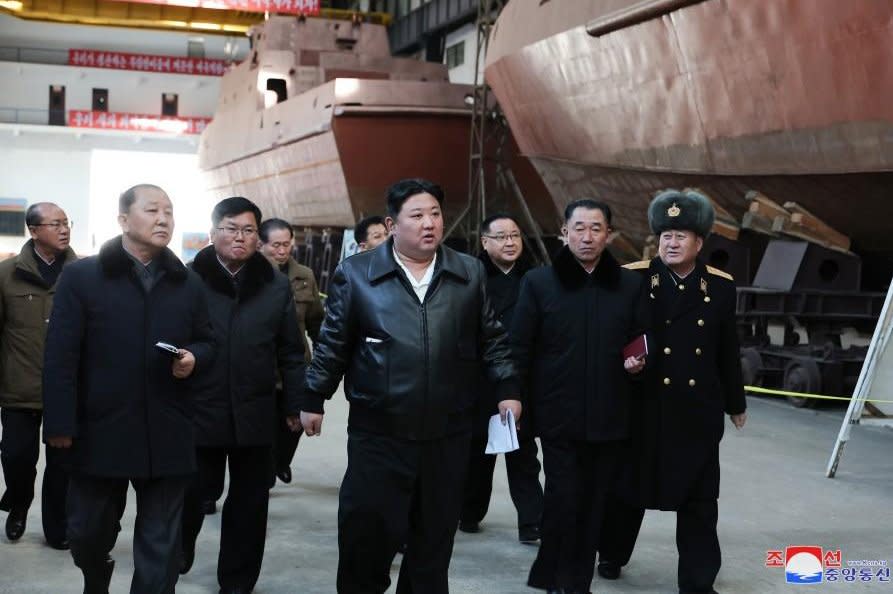Kim Jong Un calls for boosting ‘war preparations’ at naval shipyard

- Oops!Something went wrong.Please try again later.
SEOUL, Feb. 2 (UPI) -- North Korean leader Kim Jong Un called for building up the country's naval forces in order to intensify war preparations, state-run media reported Friday, as tensions on the Korean Peninsula remain at their highest in years.
Kim toured the Nampho Dockyard, located at a major seaport on the west coast, to review the construction of new warships, Korean Central News Agency reported.
"The strengthening of the naval force presents itself as the most important issue in reliably defending the maritime sovereignty of the country and stepping up the war preparations at present," Kim said, according to KCNA.
The visit comes on the heels of several weapons tests over the past month, including the firing of new submarine-launched strategic cruise missiles.
Kim was briefed on the construction of warships in line with the five-year "new huge plan" to bolster the military that was laid out at a party congress in January 2021, the KCNA report said.
During that meeting, Kim enumerated a list of weapons to be developed, including nuclear-powered submarines, submarine-launched intercontinental ballistic missiles, "ultramodern tactical nuclear weapons" and military satellites.
A spokeswoman for South Korea's Unification Ministry, which focuses on inter-Korean issues, expressed "strong regret" over Kim's visit to the shipyard.
"North Korea continues to make military threats part of its everyday routine, creating anxiety about security among the Korean people, with the intention of undermining trust in the [South Korean] government," spokeswoman Kim In-ae said at a regular press briefing on Friday.
She added that the frequent provocations are meant to attract international attention and create "a feeling that North Korea's demands must be accepted in order to resolve the crisis on the Korean Peninsula."
In recent weeks, the North has conducted three cruise missile launches and test-fired a new solid-fuel intermediate-range ballistic missile with a hypersonic warhead.
Pyongyang also unveiled an underwater drone it claims is capable of detonating a nuclear weapon and fired artillery rounds near the de facto maritime border with the South, prompting evacuation orders on a pair of islands.
Seoul and Washington have responded to the North's provocations by strengthening their military cooperation and holding frequent joint drills -- moves that Pyongyang claims justify its own weapons development as a means of deterrence.
In a separate article published Friday by KCNA, North Korea said the growth of its nuclear arsenal was "an indispensable contribution to ... maintaining the strategic balance and stability of the world."
The piece, credited to researcher Ri Ji Song, was written in response to a recent report in British daily The Telegraph that claimed the United States was planning to station nuclear weapons in Britain for the first time in 15 years.
The move threatens global security and shows that Washington is the "chief criminal of nuclear proliferation, mastermind of nuclear arms race and chieftain of nuclear war outbreak," the KCNA article said.
North Korea's relationship with both Washington and Seoul has deteriorated sharply since a failed nuclear summit held in Hanoi in February 2019.
In recent months, Pyongyang has grown closer to its former Cold War ally Moscow, with Kim making a rare overseas visit to Russia in September.
The United States and its allies claim that the North is supplying artillery and equipment to Moscow for its attacks on Ukraine while likely receiving advanced technology for its space and missile programs in return. Pyongyang successfully launched what it claimed was its first military spy satellite in November and has announced plans for three more launches this year.
North Korea has also publicly rejected its long-held goal of unification with the South, with Kim recently calling for a constitutional change to define South Korea as its "primary enemy state and invariable principal enemy."

